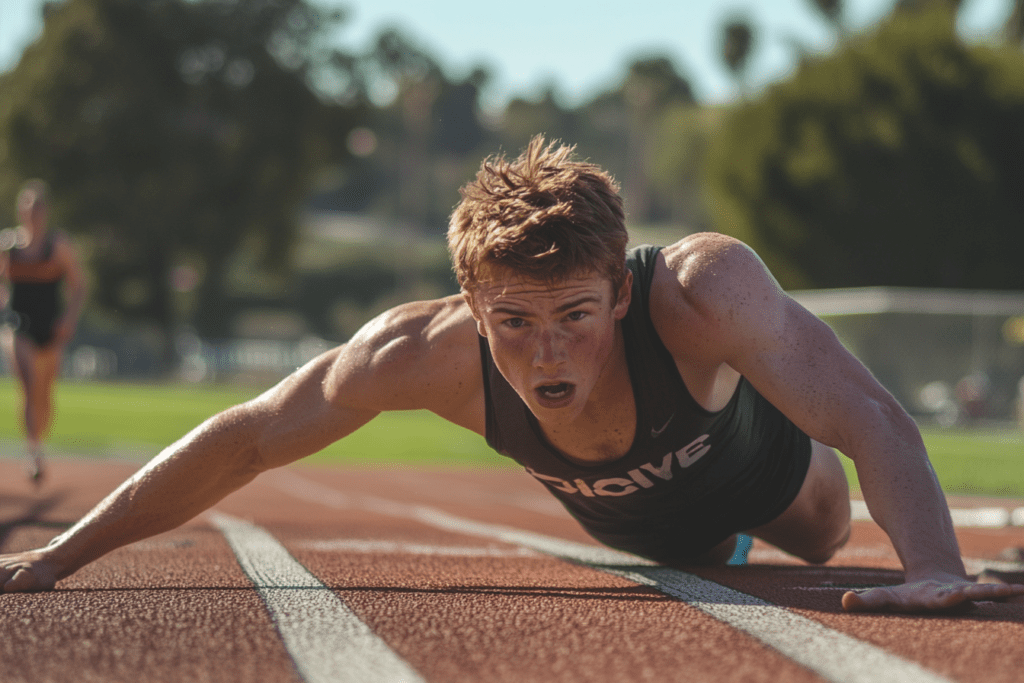Written by Jeremy Hawkins

An Intriguing Story
2024 was an Olympic year. I didn’t watch as much of the Olympics as I have in some years, but I did catch some of it. One story that intrigued me was that of Olympian Kenneth Rooks. On Wednesday, August 7, 2024, Rooks surprised the steeplechase world by winning a silver medal. And while he ran an awe-inspiring race that day, I want to focus on another aspect of his story today.
National Championships
For those unfamiliar with the steeplechase, it is a 3,000-meter race (1.86 miles) that combines running with obstacle jumping. Athletes run 7.5 laps and have to complete 28 fixed obstacles and 7 water jumps. In July 2023, Rooks ran this race in the USA National Outdoor Track and Field Championships. Having won the NCAA Division I Outdoor Track and Field Championships earlier in the year, Rooks was someone to pay attention to.
On that day in July, 2:12 minutes into the race and just before completing his second lap, Rooks misjudged a barrier and went down. At that point, he had to decide to either get back up and finish the race or call it quits. He chose to get back up.
It took Rooks two laps to catch up to the back of the pack. As the bell lap sounded, signaling the start of the final lap of the race, he began to make his move. By the time he reached the last water hazard jump (approximately 150 meters to go), he had moved up to third place. Coming down the home stretch, Rooks outkicked the two competitors ahead of him and won the race.
An Inspired Approach
I have listened to several interviews Rooks has given about this race. The following concepts jumped out to me about Rooks and his approach that summer day. I share them in no particular order and with some reflection questions to get you thinking.
1. Role Models
During Rooks’s post-race interview, he said that after getting up he had to “Go into Henry Marsh mode.” I had to look Henry Marsh up. It turns out he was also a steeplechaser from BYU. He held the school record for the 3000-m Steeplechase for 46 years until it was broken by Rooks on May 8, 2023. According to his Wikipedia page, Marsh was nine times the American champion in the steeplechase and is considered one of the best steeplechasers in American history. Do you know what his race strategy was? To start at the back of the pack and work his way up. I can see why his was a “mode” Rooks wanted to go into.
Who are your role models? Can and do you try to emulate them in times of difficulty?
2. A Plan
As part of that same post-race interview, Rooks said, “Before the race I went through the scenario of what would I do if I fall.” The man interviewing him said something to the effect of, “You really did that?” In another interview, Rooks spoke of an experience with his coach from a few weeks before where he had fallen in practice. That had taught him to consider what he would do if he fell in a race. Making it a practice to ‘come up with plans’ ahead of time allows Rooks to think and react quickly if and when he falls while racing.
What experiences have you had that have helped you to prepare or plan for similar experiences that have occurred later on?
3. Expert Guidance
Rooks originally went to college as a cross-country runner. Before college, he won several state titles in cross-country and track, so this seemed like a natural fit. However, after not competing as well as anticipated at the collegiate level, his coach made an unexpected suggestion – to switch his event to the steeplechase. With an NCAA Championship, a USA National Title, and an Olympic Silver Medal behind him, I would say that was good advice.
What advice have you received that didn’t seem to fit with your plan at the time but made all the difference in the end?
I am not an Olympian – Can I Relate?
One of the aspects of the National Championship race that I find most intriguing is that even after getting up, coming from behind, and winning, Rooks did not hit the world championship steeplechase standard of 8:15. He had to race again, multiple times, to get to that point. Hitting that standard at some point in the next year made it possible for him to win the Silver Medal in Paris.
This fact makes the entire situation more relatable to me. I fall, I get up, I keep fighting, yet I sometimes still come up short. And that’s ok. What matters is how I respond. Do I focus on the bother of falling? Or am I grateful for the opportunity to get back up and continue to fight? Do I worry too much about not hitting a certain standard? Or do I appreciate the progress I am making towards that standard? Rooks took advantage of having a role model, a plan, and guidance from experts to find success. Do I do the same? Do you? I would love to hear your story in the comments below.




